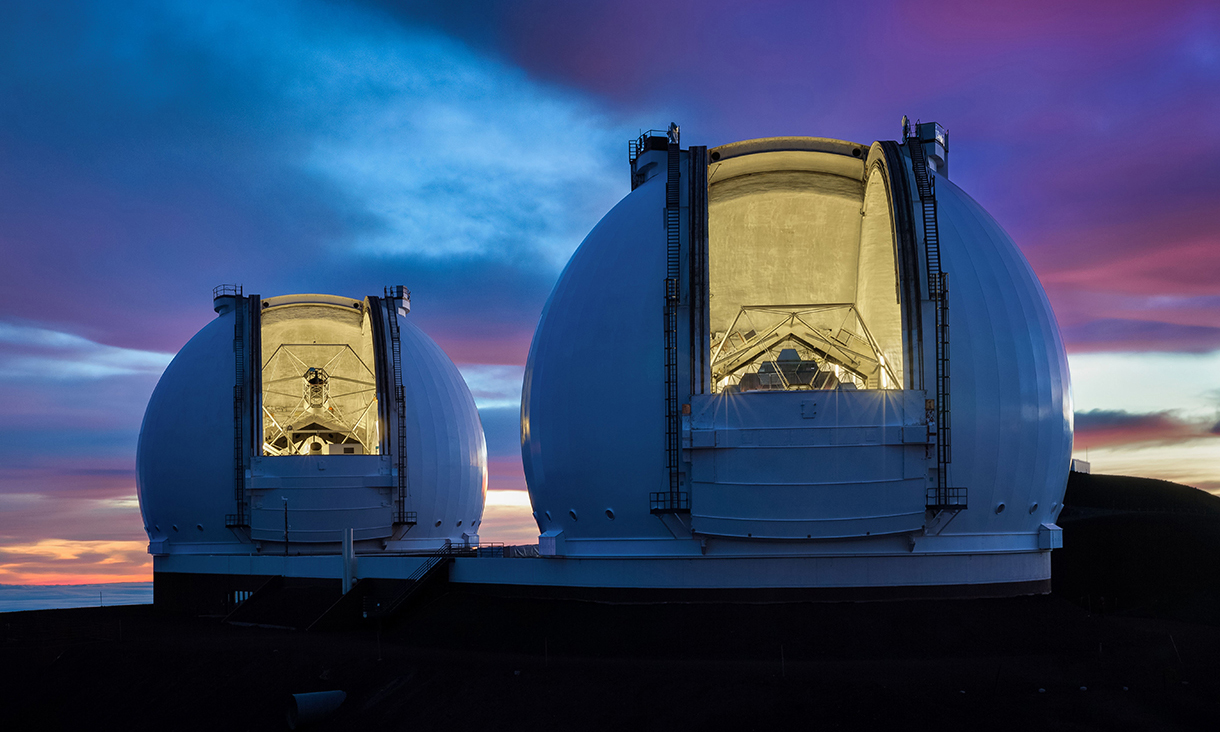Swinburne and W. M. Keck Observatory form historic scientific partnership to unlock new era of space discovery

Located 4,200 metres above sea level on the dormant volcano Mauna Kea, the Keck telescopes have provided some of the most spectacular views of the universe ever obtained.
In summary
- Swinburne has become the first organisation outside the United States to join the W. M. Keck Observatory in Hawaiʻi as a scientific partner
- The new partnership doubles the number of observing nights for Swinburne researchers and will provide Swinburne with a vote in setting science and technology priorities for the Observatory
- The partnership will substantially increase Swinburne’s opportunities to lead high-impact science for the next decade
Swinburne University of Technology has become the first organisation outside the United States to join the W. M. Keck Observatory in Hawaiʻi as a scientific partner.
The new scientific partnership doubles the number of observing nights for Swinburne researchers and will provide Swinburne with a vote in setting science and technology priorities for the Observatory. New instrumentation and software development projects will build capability in cutting-edge technologies at Swinburne and within Australia.
The announcement builds on Swinburne’s 15-year association with the Observatory through a strategic agreement with Caltech under which Swinburne researchers have been able to demonstrate outstanding scientific results. These include:
- Cosmic telescope reveals inner workings of two proto-galaxies
- New stars create space pollution
- Fossil from the Big Bang discovered with giant telescope
Swinburne has an established track record in world-class astronomy and astrophysics and is at the forefront of space and aerospace research and technology, a sector that is projected to be worth US $1.1 trillion by 2040.
Swinburne astronomers can operate the telescopes remotely from a control room more than 9000 kilometres away, built with a generous donation from the Eric Ormond Baker charitable fund.
The formation of the new scientific partnership with Keck Observatory will substantially increase Swinburne’s opportunities to lead high-impact science for the next decade.
“This historic agreement will help to secure Australia’s future as a global leader in astronomy and space technology,” says Swinburne Vice-Chancellor and President, Professor Pascale Quester.
“Space is one of Swinburne’s flagship areas. With deep industry partnerships, our researchers and students are bringing people and technology together to build a better world.
“With access to significantly more observing nights, Swinburne’s astronomers can take leadership roles in high-impact science programs, working with the world’s best scientists at Caltech, University of California, NASA, University of Hawai‘i, and elsewhere, to lead the next generation of major discoveries.”
Keck Observatory Interim Director Rich Matsuda says: "We are excited to welcome Swinburne University of Technology as a scientific partner. Their values, vision, and strong commitment to serving the global astronomy community aligns with our mission, and we look forward to working together on the quest to uncover exciting, fundamental knowledge about universe that has yet to be revealed.”
The United States Ambassador to Australia, Her Excellency Caroline Kennedy offered her congratulations on the new partnership in a video message.
“Australia and the US have such a strong history of partnership in space. We couldn’t do it without Australia, and I can’t wait to see all the discoveries that are going to come from this exciting partnership,” Ambassador Kennedy says.
About W. M. Keck Observatory
The twin Keck I and II telescopes, each 10 metres in diameter, are located on top of Maunakea, at a height of some 4,200 metres above sea level, or roughly ‘halfway to space’ in terms of the Earth’s atmosphere. They are the world’s largest and among the most productive ground-based observational facilities at optical and near-infrared wavelengths.
-
Media Enquiries
Related articles
-

- Technology
- Science
- Engineering
Victorian students drive green energy transition through international hydrogen competition
Swinburne’s KIOSC, in collaboration with Horizon Educational and Gippsland Tech School, co-hosted the Hydrogen Grand Prix in Melbourne.Friday 26 July 2024 -

- Science
Skin, scales and fish tails: using collagen to turn fish guts into gold
New research from Swinburne could transform the sector by converting high value collagen proteins from seafood by-products into cosmetics, food, and pharmaceuticals.
Tuesday 02 July 2024 -

- Astronomy
High school students work with Swinburne astronomers on the future of space
Swinburne’s Youth Space Innovation Challenge has inspired over 330 Australian teenagers to pursue a career in STEM.
Friday 26 July 2024 -

- Science
- Engineering
Submarines in the future could self-identify cracks and self-heal thanks to Swinburne researcher
Thanks to the work of Dr Nisa Salim from Swinburne University of Technology’s School of Engineering, future submarines could self-identify microcracks and self-heal using a new kind of carbon fibre reinforced polymer composites.
Monday 17 June 2024 -

- Science
Inaugural Swinburne-CSIRO Indigenous Research Fellow joins national water quality forecasting project
Swinburne University of Technology has appointed spatial ecologist Associate Professor Sally Waller as its inaugural Swinburne-CSIRO Indigenous Research Fellow...
Thursday 13 June 2024

